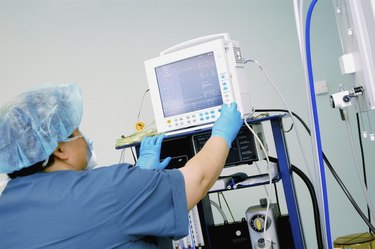
A slow heart rate, called bradycardia, may result from various medications. Some drugs were developed specifically to slow the heart rate. But bradycardia may be an unwanted side effect of a wide range of other medications that were not developed to have any impact on the heart. When taking more than one medication that can slow the heart rate, the additive effect has the potential to be profound.
Beta Blockers
Video of the Day
Beta blockers are a frequently used class of cardiovascular drugs. Some commonly prescribed beta blockers include metoprolol (Lopressor, Toprol XL), carvedilol (Coreg) and atenolol (Tenormin). They are used to treat high blood pressure, certain types of heart failure and several types of heart rhythm disturbances. Beta blockers are also first-line drugs for people who have suffered a heart attack. They slow the heart rate and have other effects that collectively decrease the workload on the heart.
Video of the Day
Calcium Channel Blockers
Calcium channel blockers are another commonly prescribed class of high blood pressure medications. Some drugs in this class also decrease the heart rate and are often used to help lower the heart rate in rhythm disturbances associated with an abnormally fast heart rate. Older calcium channel blockers, such as verapamil (Calan, Isoptin, Verelan) and diltiazem (Cardizem, Cartix XT, Taztia XT), can lower the heart rate significantly, particularly at higher dosages. Newer drugs, such as amlodipine (Norvasc), do not exert a significant effect on the heart rate.
Digoxin
Digoxin (Lanoxin) is frequently used to treat certain forms of heart failure and slow the heart rate in some abnormal heart rhythms. This drug has the potential to be both beneficial and toxic. As a result, doctors commonly monitor the digoxin blood level, something that is not done with beta blockers and calcium channel blockers. Digoxin levels may build up when the kidneys are not functioning normally. Thin, older adults may also have a higher risk of digoxin toxicity than the general population.
Other Drugs
While other cardiovascular drugs can slow the heart rate -- such as clonidine (Catapres) and sotalol (Betapace) -- some drugs were specifically designed to exert their effects via specialized actions on specific parts of the heart, including its intricate electrical conduction system. This system controls and coordinates the heart rate. These drugs tend to have a higher potential for bradycardia than other, noncardiovascular medications. However, numerous other drugs may, in certain individuals, slow the heart rate. Examples include donepezil (Aricept), morphine (Avinza, Kadian, MS Contin) and lithium (Lithobid).
Warnings
Mild bradycardia frequently causes no symptoms. However, severe bradycardia may cause dizziness, fainting, chest pain, unusual fatigue, shortness of breath or confusion. These symptoms require immediate medical evaluation.
Is this an emergency? If you are experiencing serious medical symptoms, please see the National Library of Medicine’s list of signs you need emergency medical attention or call 911.